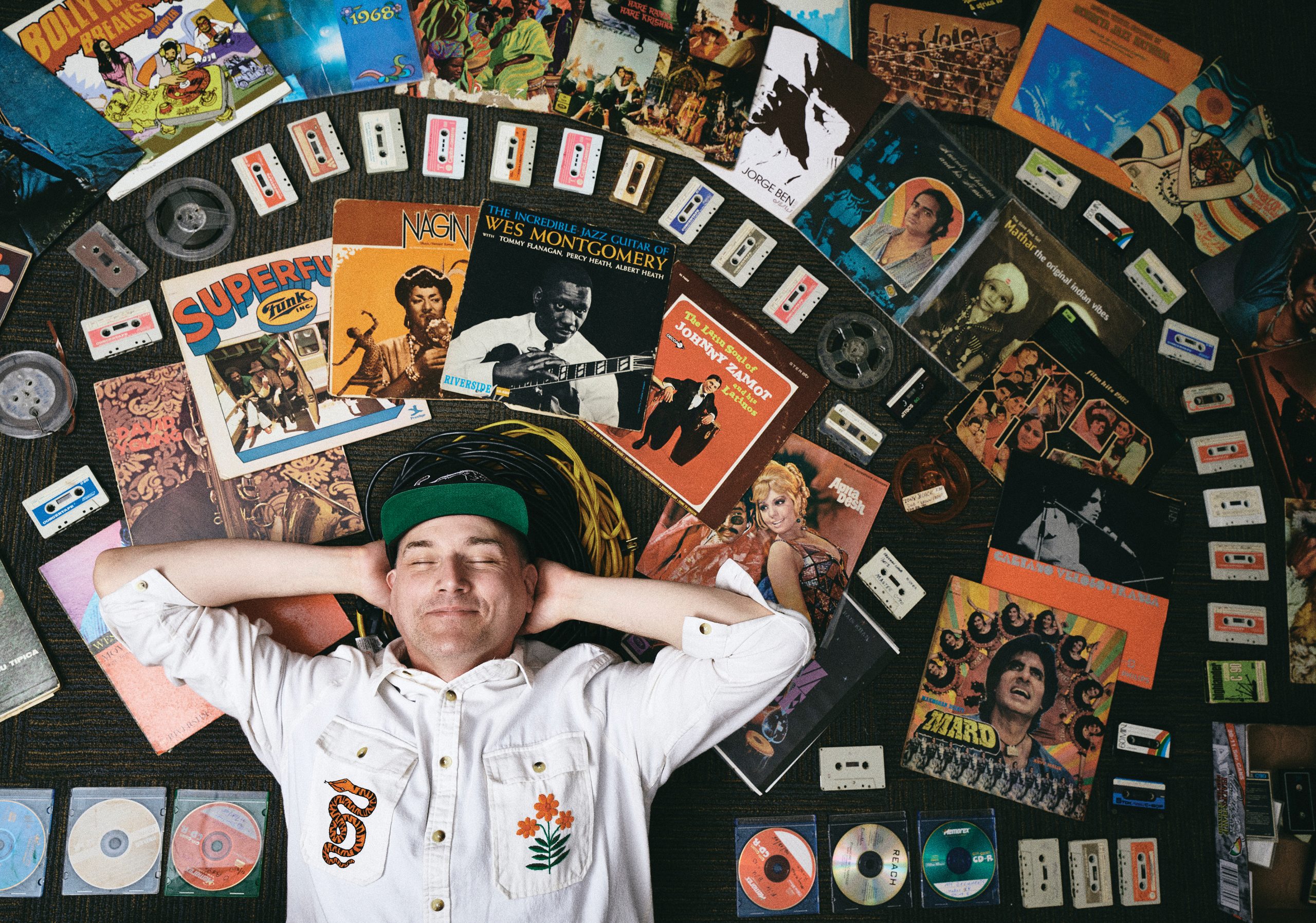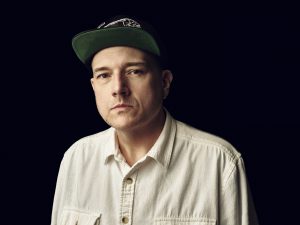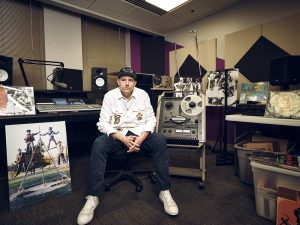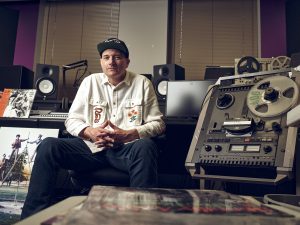
Photos by Jay Goldz
GROWING UP without much, Kyle Long was forced to scrounge through Goodwill stores, local library sales, and Indian supermarkets for used records and tapes. That unleashed his fascination and obsession with sound and motivated him to take deep dives into local music history. As a result, he became a DJ and music journalist, as well as the driving force behind two WFYI-FM radio shows, Cultural Manifesto and Echoes of Indiana Avenue, on which he unearths the works of unheralded musicians who helped build the tunes of our city and state.
You’ve probably never heard of Lester Johnson, who was with the Ebony Rhythm Funk Campaign, a soul and funk band. Or Billy Wooten, a jazz vibraphonist who also recorded with some Blue Note Records artists. Or the Haughville Slickers, who played Cleveland-style polka. But Long has, and he can tell you why they’re significant. Did you know there was a lesbian music scene in Indianapolis in the 1970s? Do you know why the Beatles’ first record came out on an Indiana-based record label? Or what else was happening musically in Gary when the Jacksons were getting ready to break out?
 Kyle Long knows. And though his focus is usually on the little-known, he’s gotten the notoriously difficult Brian Wilson to talk about the influence Indianapolis quartet The Four Freshmen had on the Beach Boys. He’s also spoken to Carlos Santana about the importance of legend Wes Montgomery to Santana’s guitar playing. Lucky for Long—and for us.
Kyle Long knows. And though his focus is usually on the little-known, he’s gotten the notoriously difficult Brian Wilson to talk about the influence Indianapolis quartet The Four Freshmen had on the Beach Boys. He’s also spoken to Carlos Santana about the importance of legend Wes Montgomery to Santana’s guitar playing. Lucky for Long—and for us.
“I think a lot of people think I’m just pulling this stuff off Wikipedia or something,” Long says. “It just couldn’t be further from the truth. A lot of the episodes of the programs I produce are literally years in the making. It’s just that mystery of, Where did this music come from? and wanting to better understand what existed before I came along. And the more I learn about this stuff, the more compelling the story is.”
Long is 49. He’s tall and lean and looks like a younger version of the late comedian Norm MacDonald. We’re sitting in a WFYI studio that temporarily houses his latest acquisition—a collection of tapes that belonged to a local soul songwriter named Tony Black. Black died in 2020, after which his son Evan decided to gift Long his father’s expansive archive, which contains the earliest known cuts of Kenneth “Babyface” Edmonds’ original music; lost sessions from Lamp Records, Indianapolis’ version of Motown Records; and early recordings from WTLC-FM.
The collection includes music on microcassettes, floppy disks, flash drives, and multiple sizes of reel-to-reel, all delivered in trash bags. Eventually, Long will sort them and use them to tell another previously hidden story. “When Kyle started with us, I had no idea of the depth and passion of his knowledge,” says Roxanna Caldwell, WFYI’s director of radio. “It was a hidden gem, honestly—a buried treasure that we did not know we were about to unearth.”
 Long began building his knowledge base in an Avon trailer park, where he lived with his mother and younger sister. He had few friends and even less interest in school. But he had a constant companion: music. He remembers reading about the iconic Bollywood singer Lata Mangeshkar, who held the world record for making the most recordings of any vocalist in history. That led him to an Indian grocery store, where he bought her cassettes. Soon, his interest expanded to learning about the music of immigrants to Indiana. “Immigrants have been here for much longer than we realize, making contributions to the culture,” he says. “So I would go to these stores and, for hours, pore through the tapes, look at the covers. And I discovered this whole scene of Bollywood funk and psychedelic music that was in vogue in the ’70s.”
Long began building his knowledge base in an Avon trailer park, where he lived with his mother and younger sister. He had few friends and even less interest in school. But he had a constant companion: music. He remembers reading about the iconic Bollywood singer Lata Mangeshkar, who held the world record for making the most recordings of any vocalist in history. That led him to an Indian grocery store, where he bought her cassettes. Soon, his interest expanded to learning about the music of immigrants to Indiana. “Immigrants have been here for much longer than we realize, making contributions to the culture,” he says. “So I would go to these stores and, for hours, pore through the tapes, look at the covers. And I discovered this whole scene of Bollywood funk and psychedelic music that was in vogue in the ’70s.”
He quit school at 16—“I couldn’t figure it out. I was not good at it.”—and instead spent his time at the Indianapolis Public Library. “I remember, you could check out up to 80 records at one point, and I would have the maximum number of records, tapes, and books at any given moment that you could have.” He also worked a series of “terrible” jobs— clerking at a gas station, stocking shelves at a supermarket. He was 30 and working in a restaurant when both his mother and sister died within a couple months of each other. “It forced me to reinvent myself and rethink my life,” he says. “And things that I might have been scared to do or hesitant to do before, I just felt more of a courage to do them.”
DJing was one of those things. The idea of being the center of attention terrified him. But he did it, anyway. A gig playing at IUPUI for the International Student Association, where he played Indiana Bollywood and Brazilian music, as well as Fela Kuti, the Nigerian performer and political activist, went well. “It’s like I opened something up that had been bottled.” A second gig at Garfield Park Arts Center went equally well. “People were connecting to this music in this way that was very special.”
Long was working in the kitchen of a downtown cafe when the owner asked him to play down-tempo music between 5 and 9 p.m. Long suggested playing other kinds of music after 9, leading to a night of Brazilian forró—“like partners’ dance music with accordions”—which caught fire with the public. So did Indian music night. Soon, DJ Kyle Long had lines around the building.
Word spread. He and visual artist Artur Silva developed a partnership called Cultural Cannibals that put on events around the city. The alternative paper Nuvo took interest and assigned a writer to profile Long. Then Nuvo invited Long to contribute stories.
In 2012, he started a weekly column. Subject matter included the musical heritage of Indiana Avenue and other regional song history, the contemporary underground scene, and immigrant music culture, which involved a visit to a westside discount mall where vendors sold cassettes from Latin America. “I was going to the Somalian and Ethiopian grocery stores and writing about the music they were selling. So, I was just covering local music in a way that was different.” Later, he accompanied the articles with podcasts.
Ed Wenck, then-editor of Nuvo and a radio veteran, thought Long’s efforts deserved to be on the radio. “I was astonished at the depth of his knowledge with each and every person that he was speaking to,” Wenck says. “It was some of the most well-researched stuff I’d ever heard. And he had a very natural ability when it came to interviewing people and keeping the flow going of a natural conversation while sounding both authoritative, informative, and relaxed.” Wenck brought the idea to Caldwell at WFYI. In 2014, she put Long’s Cultural Manifesto on one of the station’s high-definition signals, which ordinarily would have guaranteed that no one heard the show. But Long promoted himself well enough to get listeners. In 2015, he made his debut on the main signal, 90.1. Five years later, when A Prairie Home Companion stopped making new episodes, Caldwell saw room to grow Long’s audience. Echoes of Indiana Avenue is the result. Long teamed up with Herman “Butch” Slaughter, who had grown up in the Indiana Avenue area and performed with a soul group called Words of Wisdom. In 2023, their partnership earned them a regional Edward R. Murrow Award.
 Today, Cultural Manifesto has an average of 8,600 listeners a week, and Echoes of Indiana Avenue has another 6,000. The podcasts of both shows are downloaded 5,500 and 2,000 times a month, respectively. And Long has become the curator and caretaker of Indianapolis music history. Musicians trust him to tell their stories. Musicians’ families trust him to remember their loved ones’ contributions.
Today, Cultural Manifesto has an average of 8,600 listeners a week, and Echoes of Indiana Avenue has another 6,000. The podcasts of both shows are downloaded 5,500 and 2,000 times a month, respectively. And Long has become the curator and caretaker of Indianapolis music history. Musicians trust him to tell their stories. Musicians’ families trust him to remember their loved ones’ contributions.
That’s a heady position to be in for a guy like Long, who started with nothing. “It’s interesting the way Kyle connects with musicians,” Wenck says. “A lot of those folks he profiles are just doing what they love and barely making rent, much less food money. And I think there’s a shared experience there that, whether consciously or not, he kind of speaks to.”





